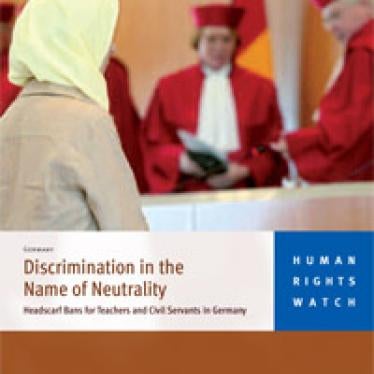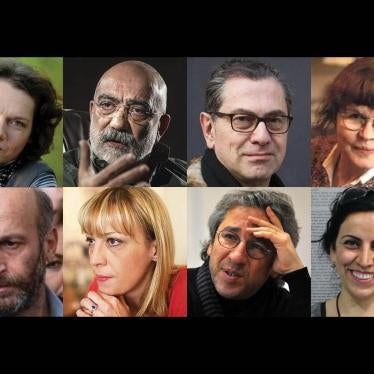The tragic attacks in Norway highlight growing intolerance against Muslims, Roma and migrants in Europe. Populist, anti-Muslim, anti-Roma and anti-immigrant parties have enjoyed recent electoral success across Europe. Opinion surveys and political debate manifest rising xenophobia. These trends are linked to concerns about the integration of migrants, the economic crisis and fears around terrorism and loss of cultural identity. The ideology and rhetoric of populist parties and wider intolerance should be challenged. Yet many policies across Europe focus instead on countering extremism within Muslim communities, condemning multiculturalism and mandating integration for migrants in ways that have proven both discriminatory and counterproductive. Human Rights Watch has analyzed problematic state responses to rising intolerance in Italy, France, the Netherlands, Belgium, Germany, Hungary, the UK, and at EU level.
For more information, please see: Q&A: Human Rights in Europe in the Aftermath of the Norway Attacks
A selection of our recent reports and publications:
Italy: Everyday Intolerance (Report, March 2011)
Italy: Act Swiftly to End Racist Violence (Press Release for Report)
The Italian government is failing to take effective action to prevent and prosecute racist and xenophobic violence.
France: Senate Should Revise Immigration Bill (Press Release, February 2011)
French senators should remove provisions in the draft immigration law that are incompatible with human rights norms.
Open Letter to French Senators on Immigration Bill (February 2011)
This letter expressesHuman Rights Watch’s serious concerns about a variety of provisions in the immigration bill currently under examination in the Senate. The memorandum annexed to this letter sets out our analysis and detailed recommendations.
World Report 2011: European Union (January 2011)
The scale of the challenge to ensure full respect of human rights in the EU was underscored by evidence of growing intolerance-manifest in electoral success by far-right parties, including in ruling coalitions, and policies targeting Roma, Muslims, and migrants-and ongoing concerns over abusive counterterrorism policies, inadequate access to asylum, and uneven protection against discrimination.
Questions and Answers on Restrictions on Religious Dress and Symbols in Europe
(December 2010)
A growing number of European countries have passed or are contemplating restrictions on religious dress in public places. The debate about the wearing of Muslim veils reflects tensions in increasingly pluralist societies struggling with integration, national identity and security.
France: Reject Anti-Roma Bill (Press Release, September 2010)
The French parliament should reject measures in an omnibus immigration bill that appear to target Roma and weaken migrants rights.
EU: A Key Intervention in Roma Expulsions (Press Release, September 2010)
The strong condemnation by the European commissioner for fundamental rights, Viviane Reding, of France’s expulsion of Roma to Romania and Bulgaria sends a powerful message against discrimination.
How Not to Liberate Women (Commentary, April 2010)
Bans on full-face veils being considered or already in place, whether nationwide, at the municipal level, or applied in public buildings and transportation, undermine Muslim women's autonomy and religious freedom.
Belgium: Muslim Veil Ban Would Violate Rights (Press Release, April 2010)
The Belgian Parliament should vote down a bill that would criminalize wearing the full Muslim veil in all public places in Belgium.
Italy: Speed Investigation of Rosarno Attacks (Press Release, February 2010)
Prosecutions of suspects in the racist attacks early this month against migrants in Rosarno, Italy are lagging but migrants accused of participating in the unrest have already been arrested, tried, and convicted.
Italy: Human Rights Watch Interviews with African Migrants Seriously Injured in Individual Attacks
(February 2010)
Human Rights Watch visited the Rosarno region from January 20 through 22, interviewing nine African migrants, as well local authorities, the police, and civil society representatives.
Germany: Discrimination in the Name of Neutrality (Report, February 2009)
Germany: Headscarf Bans Violate Rights(Press Release for Report)
German state bans on religious symbols and clothing for teachers and other civil servants discriminate against Muslim women who wear the headscarf
Human Rights Watch Submission to the National Assembly Information Committee on the full Muslim Veil on National Territory (November 2009)
A Human Rights Watch paper submitted to the working group created by France’s National Assembly in June 2009 argues that a ban on full veils in public places would violate the fundamental rights to freedom from discrimination, freedom of religion and the right to autonomy and would be deeply counterproductive.
Headscarves: The Wrong Battle (Commentary, March 2009)
Throughout Europe, over the past decade, there has been a loud - and at times openly xenophobic - debate about whether a Muslim woman should be allowed to wear a headscarf while on duty in a government job.
EU: Integration Policies Should Respect Rights (Press Release, October 2008)
The European Union should ensure that measures aimed at integrating migrants also respect their human rights. EU integration ministers are meeting in Vichy, France, on November 3 and 4, 2008 to discuss common approaches to integration in Europe.
Netherlands: Court Rules Pre-Entry Integration Exam Unlawful (Press Release, July 2008)
The Dutch government should suspend its discriminatory “integration test abroad” – an exam on Dutch language and society – that is required for family migrants from some non-Western countries following a July 15 court ruling that the test is unlawful.
Netherlands: Discrimination in the Name of Integration (Briefing Paper, May 2008)
The 44-page briefing paper offers an analysis of the Dutch overseas integration test in light of the Netherlands’ international human rights obligations. Human Rights Watch found that people of Moroccan and Turkish origin are especially affected, while citizens from “western” countries such as Canada, Australia, and Japan are exempt.
Open Letter to the Dutch Government on the Civic Examination Abroad (July 2008)
This letter was prompted by questions to the government from members of parliament Boris van der Ham (D66) and Sadet Karabulut (SP) regarding the recent briefing paper on the Netherlands—“Discrimination in the Name of Integration,” requesting an official response to the paper.







